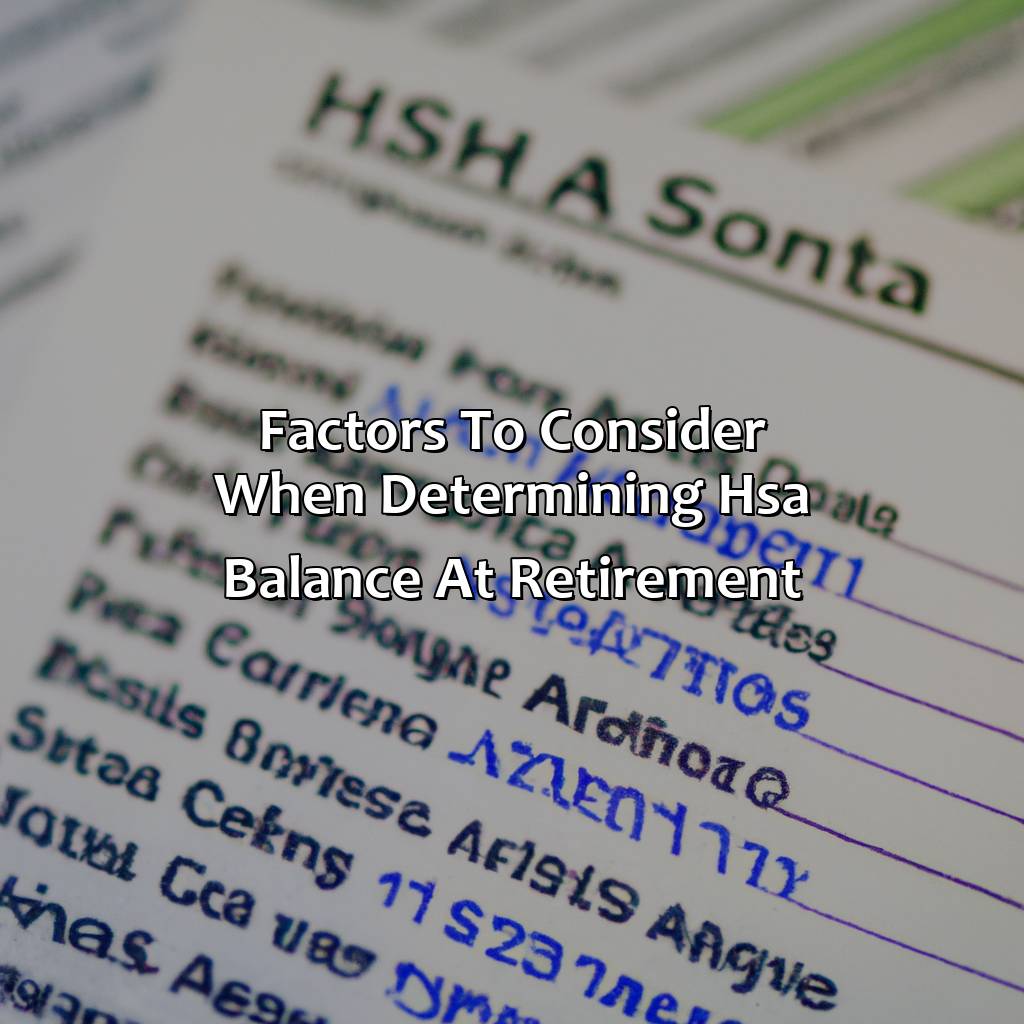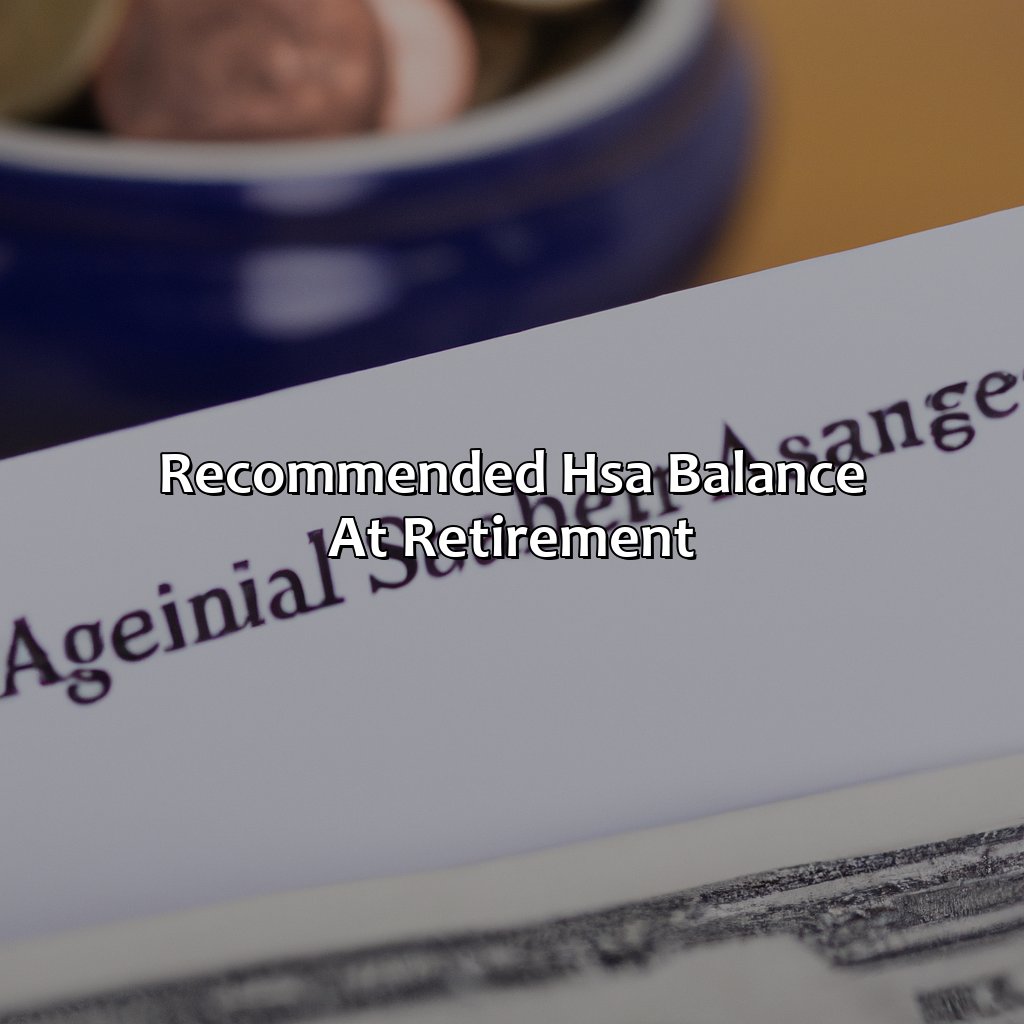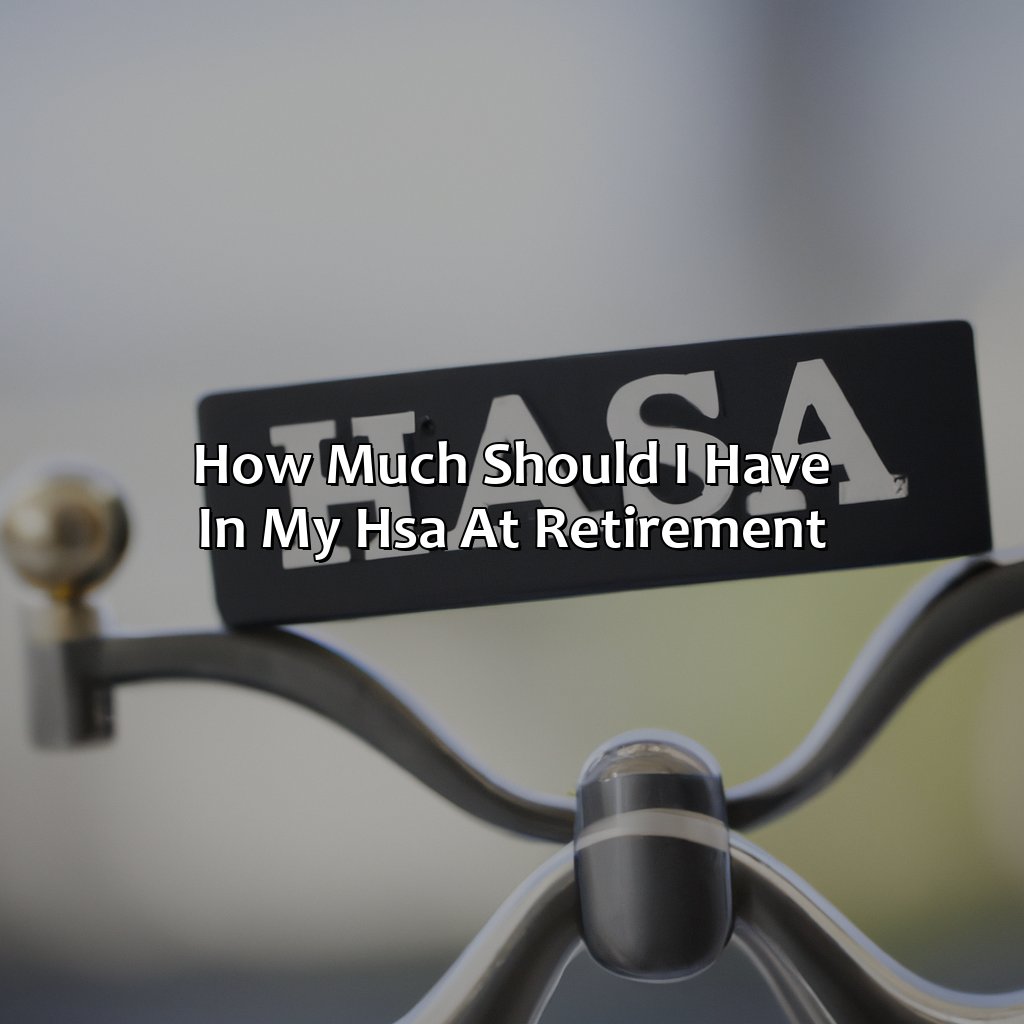How Much Should I Have In My Hsa At Retirement?
Key Takeaway:
- Estimating healthcare expenses in retirement is crucial when determining HSA balance, as it varies based on individual health conditions and lifestyle choices.
- In order to increase HSA balance, it is recommended to maximize annual contributions, consider catch-up contributions, and invest HSA funds for growth.
- While the minimum recommended HSA balance at retirement is around $50,000, an average recommended balance would be around $360,000 – $400,000 per person.
Are you worried about how to manage your Health Savings Account (HSA) when you reach retirement? Fortunately, there are options available that will help you maximize your investments and maximize your savings. You can rest easy knowing how much to have in your HSA at retirement.
Factors to consider when determining HSA balance at retirement
To figure out how many funds should be in your HSA at retirement, there are a few things to think about. This part, “Factors to consider when determining HSA balance at retirement,” can help you pick the correct saving plan. You’ll look at the topics:
- Estimated healthcare costs in retirement
- HSA contribution limits
- Investment techniques
- Other income for retirement
- Retirement aims
These are essential for making sure you save the right amount.

Image credits: retiregenz.com by James Woodhock
Estimated healthcare expenses in retirement
As one plans for retirement, it is imperative to consider healthcare expenses that may occur during the golden years. Anticipating the cost of medical procedures, medications and other health-related activities after retirement will help retirees avoid unexpected fees and have peace of mind.
Below is a table outlining estimated healthcare expenses in retirement:
| Activity | Estimated Cost |
|---|---|
| Doctor’s appointments | $150 per visit |
| Medications | $300 – $500 per year |
| Dental check-ups/cleanings | $100 – $200 every six months |
| Hearing aids | $2,500 – $7,000 per pair |
| Vision care/eyeglasses | $250-$500 per year |
It’s important to note that these estimates are not exhaustive, and there may be additional costs based on individual needs.
Planning for healthcare expenses in retirement is contingent on unique needs such as pre-existing conditions, genetic predispositions, and family history. It is also wise to consider inflation rates, changes in government policies or laws related to healthcare costs.
To avoid potentially devastating financial consequences after retirement from unanticipated medical expenses that can drastically derail their finances during an already-vulnerable time in life. Start planning now by exploring supplemental accounts like Health Savings Accounts (HSAs) or Long-Term Care Insurance plans.
As always, consult with a qualified financial advisor who can provide guidance tailored to individual needs.
Just because you’re investing in your health doesn’t mean you can’t invest in your bank account too – HSA contribution limits and investment strategies to maximize both.
HSA contribution limits and investment strategies
When it comes to maximizing your HSA’s potential at retirement, understanding the contribution limits and investment strategies is crucial. The right combination of these factors can help grow your account balance significantly over time.
In the table below, we’ve outlined the HSA contribution limits and investment options to help you make informed decisions about how to manage your account.
| Contribution Limits | Individual Coverage | Family Coverage |
|---|---|---|
| 2021 Annual Contribution Limit | $3,600 | $7,200 |
| Catch-Up Contributions for Age 55 and Older | $1,000 | $1,000 |
Investment Options
| Option | Description |
|---|---|
| Savings account with interest rates up to 0.30% APY | Risk-free option ideal for short-term savings. |
| Investments in Mutual Funds or Exchange-Traded Funds (ETFs) | Long-term growth option with higher risks but potentially higher returns. |
Remember that even if you reach the annual contribution limit, you can still invest additional funds beyond that amount. Choosing a mix of investment options based on your risk tolerance and timeline until retirement can help maximize growth opportunities.
It’s also important to note that HSAs offer tax-free withdrawals when used for qualified medical expenses. This makes them a valuable tool for retirees who may have high healthcare costs in their later years.
A recent study by Fidelity found that couples retiring at age 65 will need an average of $300,000 to cover out-of-pocket healthcare costs throughout retirement. A properly managed HSA can help mitigate these costs significantly.
(Source: Fidelity)
One-liner: Retirement goals: spending your days golfing and your nights worrying about medical bills.
Other sources of retirement income and retirement goals
When considering your HSA balance at retirement, it’s essential to take into account other sources of income and your retirement goals. Knowing your overall retirement goals is important because it will determine what percentage of funds you need to have in your HSA to cover healthcare expenses during retirement. Other sources of income such as pensions, social security benefits, and savings can help offset healthcare expenses and reduce the burden on your HSA.
In addition to understanding other sources of income and retirement goals, another crucial factor is how much you plan to spend on healthcare during retirement. If you have chronic health conditions or anticipate high medical costs, then you may need a more robust HSA balance. However, if you lead a healthy lifestyle with few health issues, then you may not require as much in your HSA.
A colleague of mine, John, planned his HSA balance at retirement by determining his projected annual healthcare expenses and adding extra funds for unexpected medical situations. This gave him peace of mind knowing he wouldn’t have to dip into his savings or rely heavily on social security benefits to cover medical bills during retirement.
The recommended HSA balance at retirement is like a unicorn- everyone talks about it, but no one has actually seen one.
Recommended HSA balance at retirement
Secure retirement? Must plan! Save cautiously.
Health Savings Account (HSA) is an option. What’s the correct HSA balance for a comfy retirement? Check Minimum recommended balance and Average recommended balance. That’s the way!

Image credits: retiregenz.com by Yuval Duncun
Minimum recommended balance
Requisite Balance for HSA in Retirement
To secure a financially sound and stress-free retirement, ensuring a sufficient HSA balance is essential. An ideal HSA balance is one that covers predicted out-of-pocket healthcare expenses during retirement.
Maintain Adequate Balance for Better Future
Experts advise a minimum recommended balance of $250,000 at retirement to cater for the long-term medical expenses that retirees are likely to experience in their old age. This calculation takes into account the rising cost of healthcare over time.
Cover All Marginal Costs
The minimum recommended balance is intended to provide financial security in later years when health problems frequently arise. It will help pay for out-of-pocket health costs or Medicare premiums. Any unused funds can be withdrawn after the age of 65 without penalty to pay for everyday expenses.
Experience Talks: John Faced Retirement Crisis Due to Low HSA Funds
John Bagwell, a 67-year-old retiree, was unable to afford necessary surgeries due to having less than half of the recommended HSA balance when he left his job. The condition worsened over time and caused him much distress and anxiety because he could not meet his medical needs comprehensively.
The average recommended HSA balance at retirement is like a unicorn- mythical and hard to achieve, but if you catch it, you’re in for a magical retirement ride.
Average recommended balance
The suggested amount for the optimal HSA balance at retirement can differ depending on various factors like age, income, health status and expected medical expenses. The required balance is different for each person which makes it crucial to start early and determine a customized plan for optimum savings.
To estimate a suitable HSA balance, you should begin with your anticipated healthcare costs during retirement. Consider all your potential expenditures such as premiums, copays, deductibles and other related expenses. It is suggested that an average person should aim to save around $200,000 in their HSA account by the time of their retirement.
A vital aspect to consider is starting early and contributing regularly to achieve long-term goals. With consistent contributions while being mindful of annual contribution limits, it’s feasible to build up substantial savings throughout your career that will adequately cover medical expenses during retirement.
Remember, unforeseen emergencies do occur; saving beyond the recommended limit may provide more flexibility when faced with unexpected or non-medical outlays. Staying healthy through preventative measures can also potentially reduce the number of medical costs incurred annually.
Want to boost your HSA balance? Try robbing a bank…just kidding, the IRS frowns upon that. Instead, check out these helpful tips!
Tips for increasing HSA balance
Maximize your HSA balance now and for retirement. Contribute the max annually. Think about catch-up contributions too. Invest HSA funds for growth. These three ideas can help you make the most of your account. It’ll improve your financial future!

Image credits: retiregenz.com by Yuval Washington
Maximize annual contributions
To make the most out of HSA accounts, it’s crucial to increase contributions annually. Boosting annual contributions ensures higher account balances and potential tax savings.
Here’s a three-step guide to maximizing annual contributions:
- Start by evaluating your current healthcare expenses and considering any upcoming medical procedures or treatments.
- Next, review IRS contribution limits and adjust your annual contributions accordingly.
- Finally, automate HSA deposits through your employer or bank to ensure consistency and avoid missing out on potential savings.
In addition to increasing contributions annually, some employers offer incentives for contributing such as matching funds or bonuses. Take advantage of these opportunities when they arise for further account growth.
Pro Tip: If you’re already maxing out annual HSA contributions, consider investing any excess funds for even more long-term gains.
Don’t wait till you’re catching your breath to consider catch-up contributions for your HSA.
Consider catch-up contributions
When Planning your retirement, maximizing contributions to your health savings account (HSA) is essential. In this context, one must contemplate utilizing catch-up contributions that provide an opportunity to accumulate more funds before retirement.
- Catch-up contributions are recommended once you turn fifty-five because this plan awards individuals a chance for an extra contribution of approximately $1000 annually.
- For twelve months after turning fifty-five you can maximize these payments regardless of when you have made the payment during the year
- Furthermore, it’s also significant to note that if both parents are more than fifty-five years old and each own their HSA top up into both accounts.
- If both spouses participate in an HSA scheme, catch-up contributions may be made on different accounts if both partners are above 55 years.
Considering employing catch-up contributions is important However, it’s vital to keep track of deadlines and understand all the details before committing to them.
Grow your HSA funds faster than a Chia Pet with these investment tips.
Invest HSA funds for growth
One effective way to maximize your HSA balance for retirement is by strategically investing your HSA funds. By leveraging the power of compound interest, you can increase your account value over time, potentially generating more significant long-term gains. Consider allocating your HSA funds towards mutual funds, stocks, or other growth-oriented assets that align with your risk tolerance and investment goals. Additionally, seek professional advice from a financial advisor to help guide you on the best investment strategy for your situation.
It’s worth noting that investing in HSA accounts carries some risks, such as market fluctuations and potential losses. Therefore, it’s crucial to be well-informed about the investment options available and make judicious decisions before investing money.
Investing in HSA funds for growth is a wise choice if you want to build up a healthy retirement savings balance. By doing so, not only would you enjoy tax-free contributions and withdrawals but also reap potentially high returns from the invested amount.
At this point, it is essential to keep in mind that overspending might lead to inadequate funds when medical emergencies occur later down the road.
Take action now by exploring different investment options available for HSAs and discuss with professionals before making an informed decision. You wouldn’t want to miss out on maximizing your retirement savings!
Five Facts About How Much Should I Have in My HSA at Retirement:
Health Savings Accounts (HSA) are tax-advantaged savings accounts that can be used to pay for medical expenses during retirement. (Source: CNBC)
Experts recommend aiming to have at least enough in your HSA to cover your maximum annual out-of-pocket healthcare expenses in retirement. (Source: Fidelity)
For 2021, individuals can contribute up to $3,600 and families up to $7,200 to their HSA accounts. (Source: IRS)
HSA funds can be invested in stocks, bonds, and other securities to potentially increase their value over time. (Source: NerdWallet)
Contributions to HSA accounts are tax-deductible, and withdrawals for qualified medical expenses are tax-free. (Source: Forbes)
FAQs about How Much Should I Have In My Hsa At Retirement?
How much should I have in my HSA at retirement?
There is no one-size-fits-all answer to this question as it depends on various factors like your health care needs, lifestyle, and retirement goals.
What is the ideal amount to save in an HSA for retirement?
The ideal amount to save in your HSA for retirement depends on your projected healthcare expenses, inflation rates, and health status. Typically, financial advisors suggest saving at least enough to cover the out-of-pocket maximum for your high-deductible health plan.
What if I can’t afford to max out my HSA contributions each year?
Don’t worry! You can still benefit from your HSA even if you’re not able to max out the contributions. Any amount you save and invest in your HSA will grow tax-free and can be used for eligible expenses in the future.
Can I use my HSA funds to cover healthcare expenses for my spouse or dependents?
Yes, as long as they are covered under your high-deductible health plan. You can use your HSA to cover eligible medical expenses of your spouse, dependents, and any tax dependents.
What happens to my HSA if I don’t use it all by the time I retire?
If you don’t use your HSA funds by the time you retire, the remaining balance stays in your account to cover future medical expenses tax-free. Additionally, once you turn 65, you can withdraw the funds for non-medical reasons without penalty, but you will have to pay taxes on the withdrawal.
Is an HSA a good option for retirement savings?
Yes, an HSA can be a great retirement savings option as it offers triple tax benefits – contributions are tax-deductible, the account grows tax-free, and withdrawals for eligible expenses are also tax-free. Moreover, there is no required minimum distribution on HSAs, giving you flexibility and control over your saving and spending.
 Checkout this IRS Loophole
Checkout this IRS Loophole 






